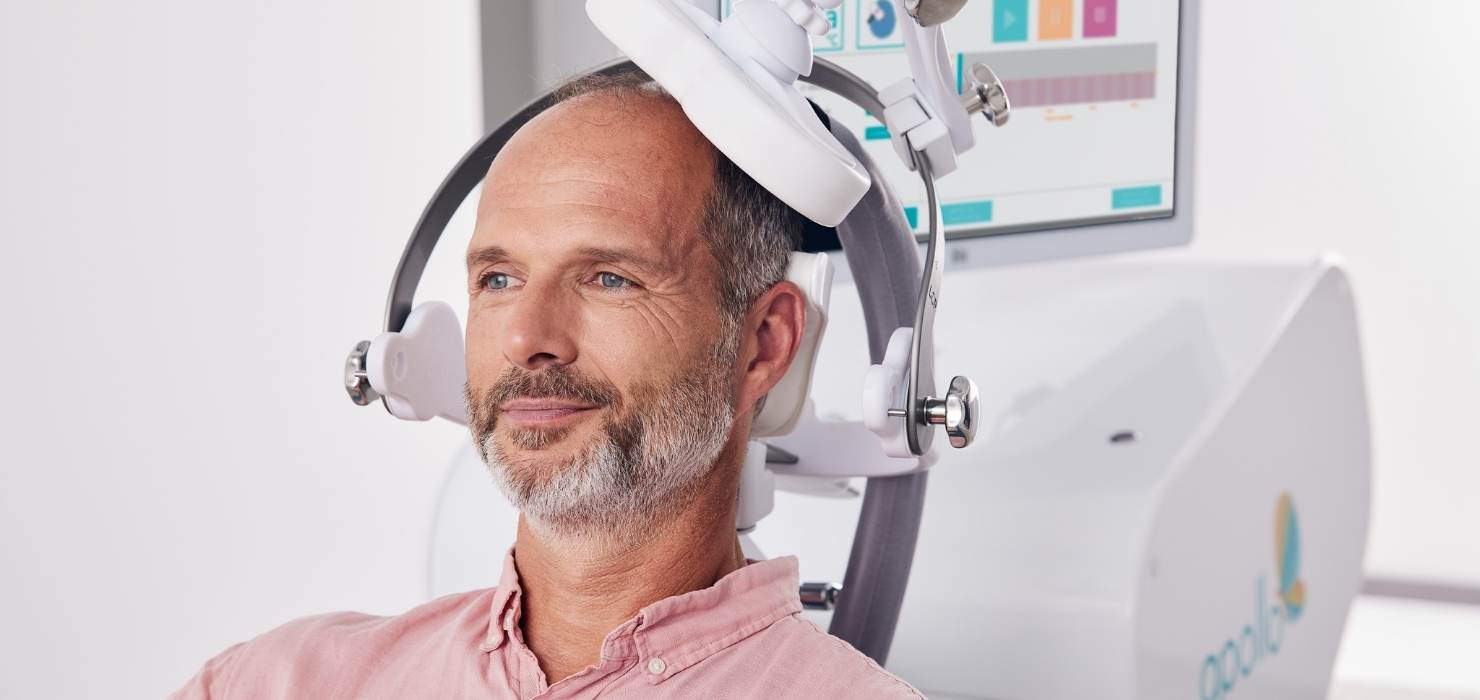rTMS
Depressieve stoornissen en dwangklachten (OCS) kunnen worden behandeld met een gecombineerde behandeling van psychotherapie met magnetische hersenstimulatie (rTMS). Repetitieve Transcraniële Magnetische Stimulatie is een goed onderzochte en wetenschappelijk bewezen behandelingsmethode met minimale bijwerkingen.

Straight to:
(repetitieve) Transcraniële magnetische stimulatie, vaak aangeduid als ‘TMS’ of ‘rTMS’, is een niet-invasieve en medicatie-vrije behandelmethode bij depressie of dwangstoornissen (OCS). Een magnetische spoel wordt geplaatst op het hoofd, die vervolgens specifieke gebieden van de hersenen stimuleert die betrokken zijn bij depressie en/of dwang (OCS).
De behandeling wordt beschouwd als een veilige en effectieve therapie. Waar electroconvulsie therapie (of ECT) therapie onder andere geheugenverlies of andere bijwerkingen kan geven, is rTMS een milde en meer gerichte stimulatievorm die lokaal effectief werkt. Een bijwerking van rTMS die soms voorkomt is lichte hoofdpijn die veroorzaakt wordt door het samentrekken van spieren rondom hals, nek en hoofd en die vanzelf verdwijnt na korte tijd.
Cliënten die deze therapie krijgen, komen in een relatief korte periode 2 of 4 keer per week naar de vestiging voor een behandeling.
Na ongeveer 10 – 20 behandelsessies zijn de eerste positieve effecten waarneembaar. In combinatie met psychotherapie kan dit effect worden versterkt en gestabiliseerd.
Hoe ziet een rTMS behandeling eruit?
De rTMS behandeling is een kortdurende, maar intensieve behandeling. Je komt meerdere keren per week naar onze vestiging voor rTMS en om te werken aan je behandeldoelen.
We bieden twee vormen van rTMS behandeling aan; een 2-daagse en een 4-daagse. Voor welke vorm je in aanmerking komt wordt afgestemd op basis van de informatie uit de intake.
2-daagse
Gedurende 16 weken kom je twee keer per week naar onze vestiging voor rTMS en de op jouw klachten afgestemde psychotherapie. Je werkt overwegend met een vaste behandelaar en jullie maken samen afspraken over behandeldoelen. Tussen de sessies door ga je zelf aan de slag met opdrachten vanuit de behandeling die met jou zijn afgesproken. Soms is een verlenging van de behandeling noodzakelijk tot 21 weken.
Regelmatig vul je vragenlijsten in, zodat je met je behandelaar goed kan volgen wat het effect is van de behandeling. Op sommige vestigingen kan je deze behandeling combineren met runningtherapie en zo nodig lichttherapie.
4-daagse
Gedurende 10 weken kom je vier keer per week naar onze vestiging voor rTMS en de op jouw klachten afgestemde psychotherapie; daarna kom je nog twee weken twee keer per week. Er zijn drie behandelaren betrokken bij jouw behandeling; twee vaste behandelaren die elk een eigen deel van de therapie oppakken en een regiebehandelaar. Met je behandelaren maak je afspraken over behandeldoelen. Tussen de sessies door ga je aan de slag met opdrachten vanuit de behandeling die met jou zijn afgesproken. Een van de twee behandelaren kan ook met je mee en kan een keer thuis komen om te oefenen. Soms is een verlenging noodzakelijk tot 13 weken.
Regelmatig vul je vragenlijsten in, zodat je met je behandelteam goed kan volgen wat het effect is van de behandeling.
Op sommige vestigingen kan je deze behandeling combineren met runningtherapie en zo nodig lichttherapie.
Voor het beste resultaat is het nodig dat TMS-sessies dagelijks of minstens twee keer per week worden gepland. Een aantal cliënten merkt antidepressieve effecten na ongeveer 5 sessies. Net zoals de individuele oorzaken van depressie verschillen, zo verschilt ook de respons op de behandeling. Over het algemeen adviseren wij 20 tot 30 sessies om de antidepressieve effecten te bestendigen. U kunt een volledige behandeling binnen één tot twee maanden afronden.
Dit maakt TMS een snelwerkende behandeling voor cliënten die op zoek zijn naar een alternatief voor antidepressieve medicatie. Bij neurocare bestaan TMS-sessies uit afspraken van 60 minuten, waarbij ook psychotherapie met een getrainde behandelaar wordt aangeboden.
Alle TMS-behandelingen worden gesuperviseerd door een psycholoog of psychiater. De sessies worden uitgevoerd terwijl de cliënt plaatsneemt in een comfortabele behandelstoel, waar een magnetische spoel op het hoofd wordt geplaatst. De spoel genereert een pulserend magnetisch veld, dat de doelgebieden in de hersenen stimuleert. Het magnetische veld genereert een merkbaar tikkend geluid. Hoewel de stimulatie niet pijnlijk is, merken veel cliënten een tintelend gevoel op hun hoofd.
Overweegt u een rTMS-behandeling?
rTMS in praktijk
rTMS wordt uitgevoerd door uw behandelaar terwijl u in een comfortabele behandelstoel zit. Tijdens de behandeling wordt een magneetspoel op het hoofd wordt geplaatst. De spoel genereert een pulserend magnetisch veld dat de doelgebieden in de hersenen stimuleert. Het magnetisch veld genereert een merkbaar tikkend geluid. Over het algemeen wordt de magnetische stimulatie niet als pijnlijk ervaren.
Voor wie is rTMS geschikt?
- Cliënten met een depressie;
- Cliënten met een ‘behandelresistente’ depressie;
- Cliënten met obsessieve compulsieve stoornis (OCS);
Contra-indicaties rTMS bij depressie en dwangklachten/OCS
Indien u depressieve klachten of dwangklachten/OCS heeft, kunt u voor rTMS behandeling in aanmerking komen. In enkele gevallen is rTMS niet mogelijk, bijvoorbeeld als u een cochlear implantaat heeft. In de intake wordt bepaald of u voor rTMS in aanmerking komt.
Vergoedingen
rTMS bij depressie.
Wordt in de meeste gevallen vergoed door uw zorgverzekering. Wilt u hier zeker van zijn neem contact op met uw zorgverzekering of een van onze vestigingen.
rTMS bij OCS (dwang)
Wordt niet compleet vergoed door de zorgverzekering. In de meeste gevallen bedragen de kosten €60,- per sessie. Neem voor vragen contact op met een van onze vestigingen. Wij helpen u graag op weg.
.png?width=2300&height=244&name=neurocare_nederlands_pos%20(1).png)
